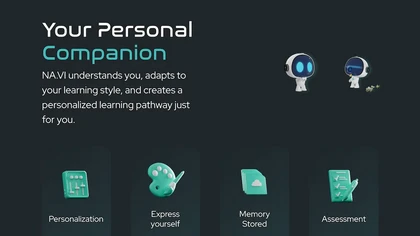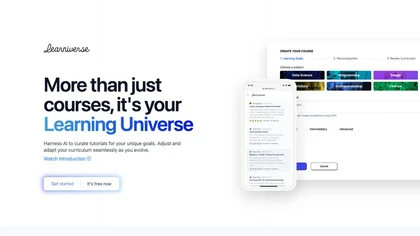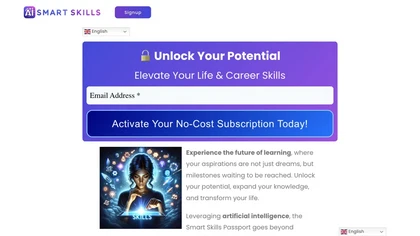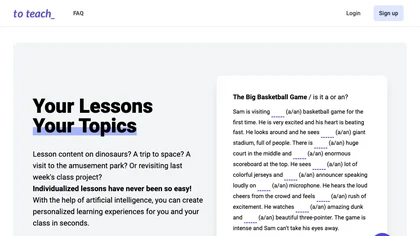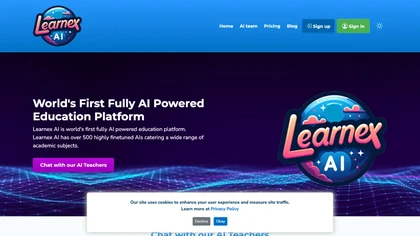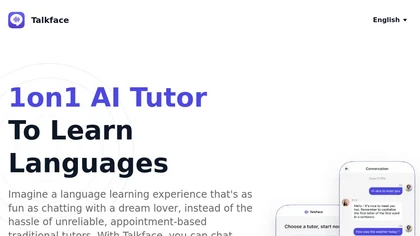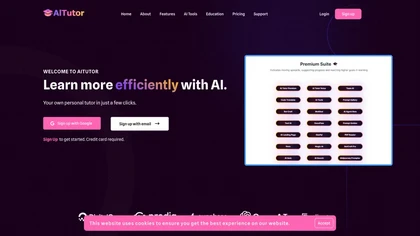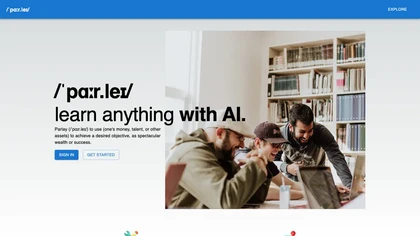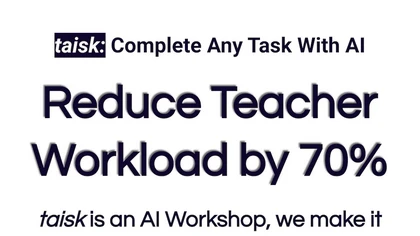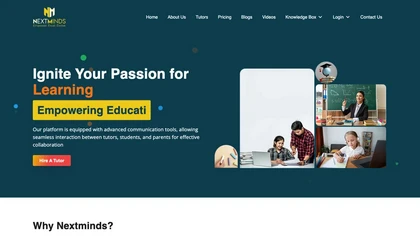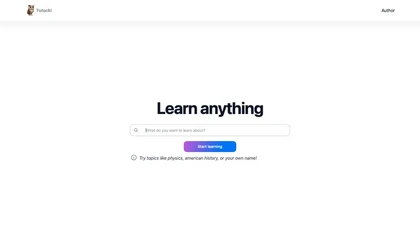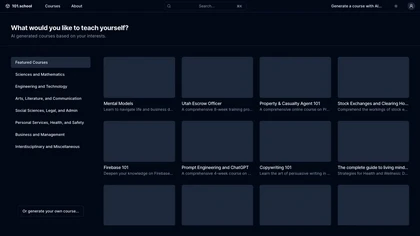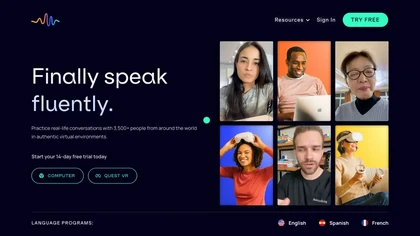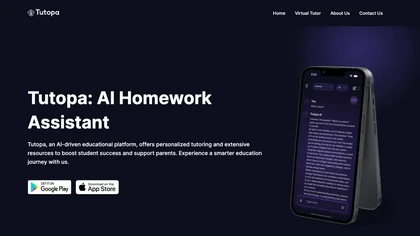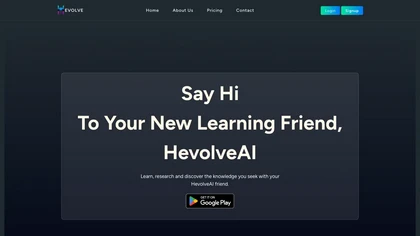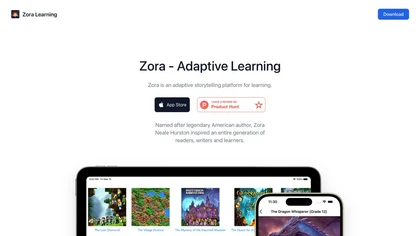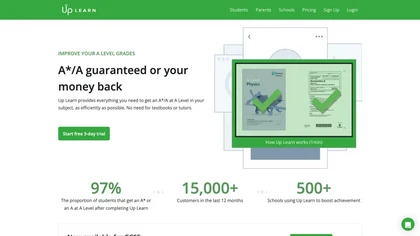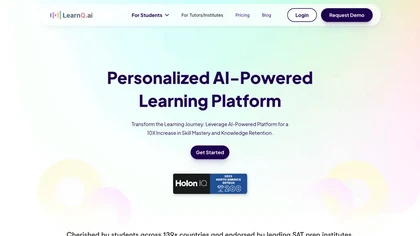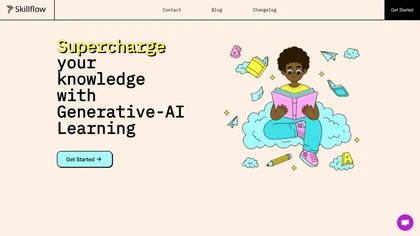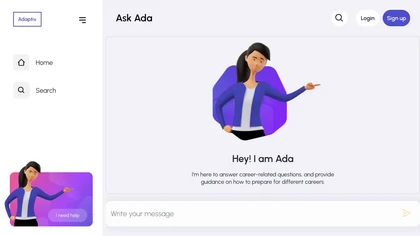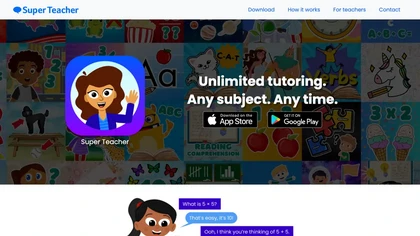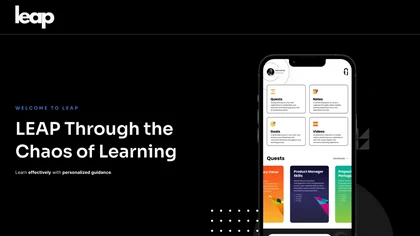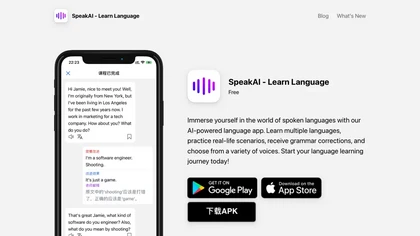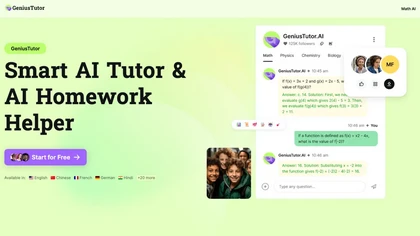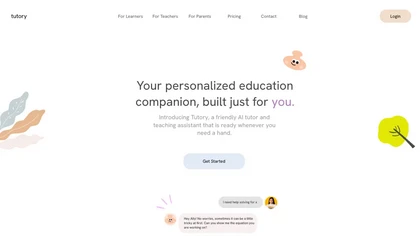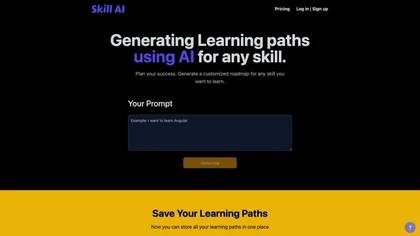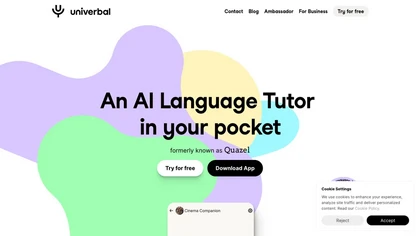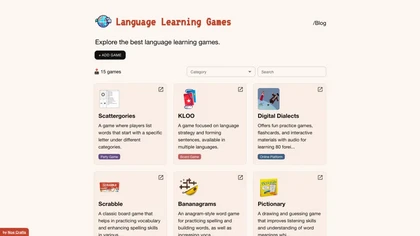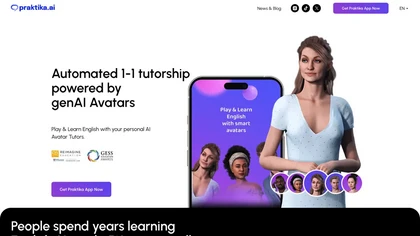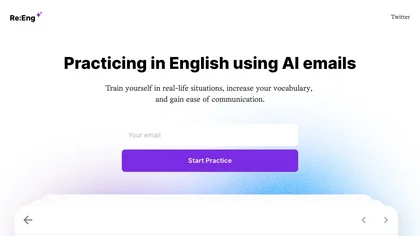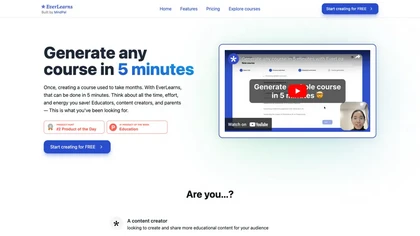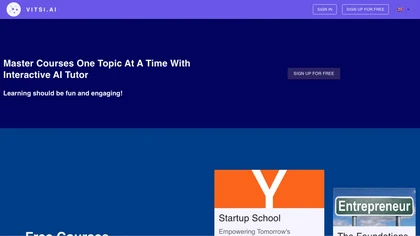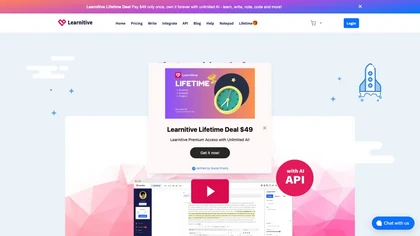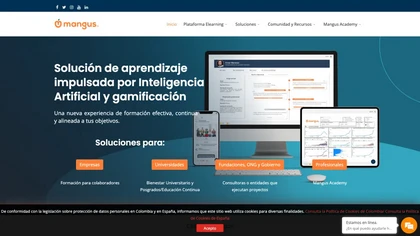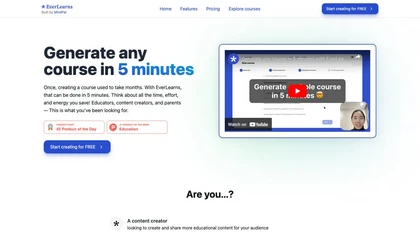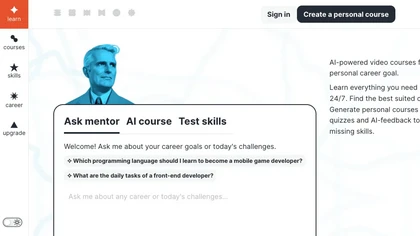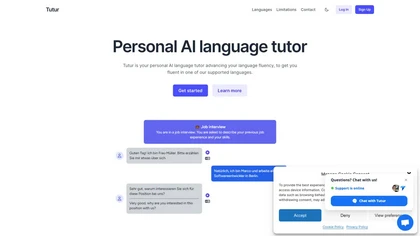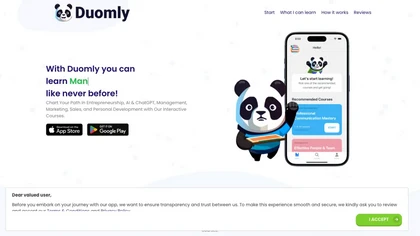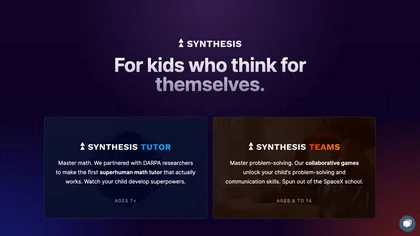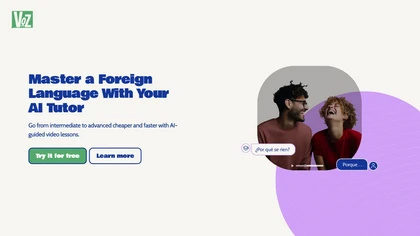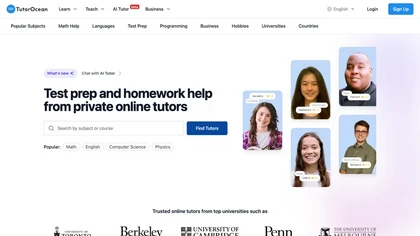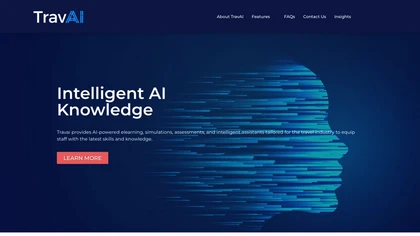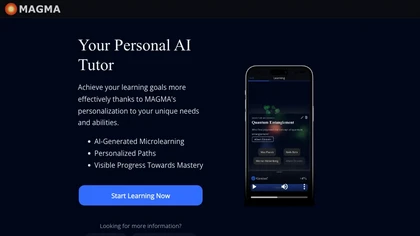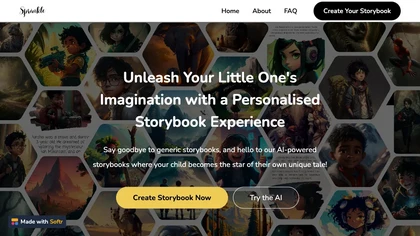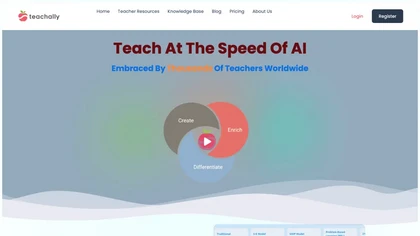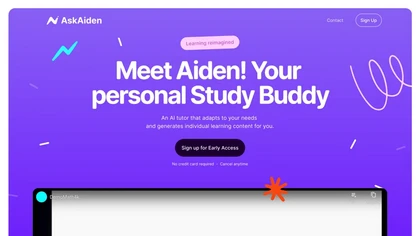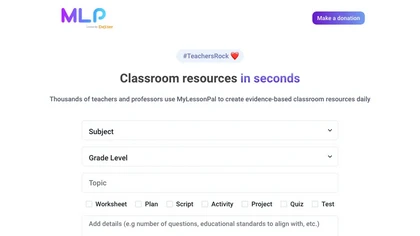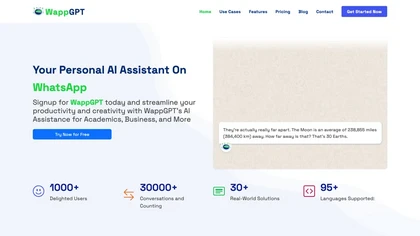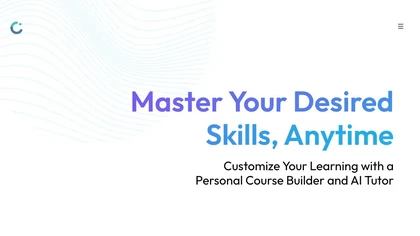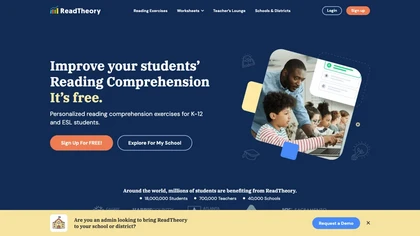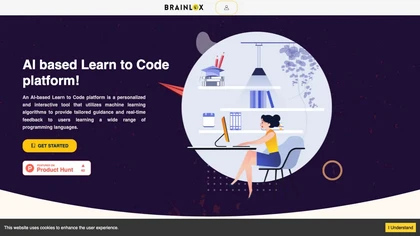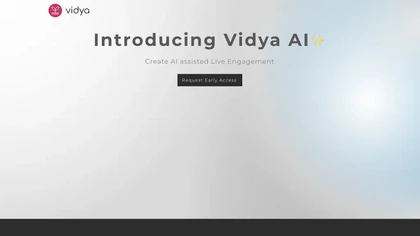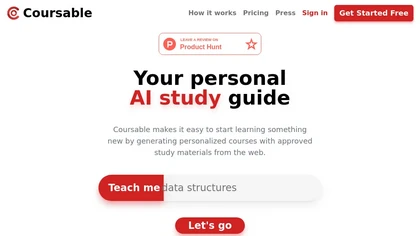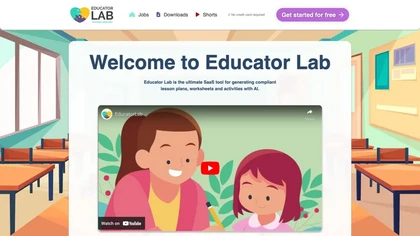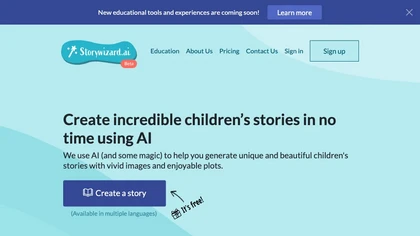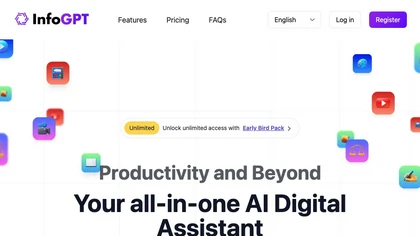AI use cases for Online learning
Generative AI can be applied in various applications for online learning. Here are some examples to explore below for inspiration with AI tools to get you started with using AI in online learning.
🛠️ 70 AI tools for Online learning
Explore a dynamic list of some of the most popular tools to get you started with various AI use cases and applications for Online learning to streamline your workflows and productivity today.
NA.VI features
- Personalized learning pathways
- Adaptive to unique learning styles
- Interactive features
- Assessment tools exploration
- Data privacy prioritization
Learniverse features
- Curates tutorials based on unique learning goals
- Seamlessly adjusts and adapts curriculum as user progresses
- Mobile-friendly UI
- Personalized pathways tailored to ambitions
- Provides trustworthy collection of educational resources
SmartLifeSkills
4.8SmartLifeSkills features
- Interactive platform with AI chatbots
- Multilingual lessons with authentic accents
- Adjustable playback speed
- Advanced text-to-speech technology
- Custom quiz generator
To Teach features
- Create personalized exercises
- Create lesson plans
- Tailor teaching materials to students' interests
- Offer free and paid plans
- Work alongside human teachers
Learnex AI features
- AI-powered education platform
- 500 highly fine-tuned AI teachers
- Chat support for various academic subjects
- Assistance in subjects like mathematics, history, sociology
- Diverse range of topics covered
immerse.com features
- Unlimited live classes
- AI-powered conversation practice
- Interactive events to connect with a global community
- AI roleplays for building confidence
- Progress tracking and task management dashboard
Talkface features
- 1-on-1 tutoring
- Personalized curriculum
- Language learning
- Fun and engaging
- Affordable solutions
- Eliminates need for unreliable tutors
- Available on android and ios devices
🔥
Create your account, save tools & get personal recommendations
Receive a weekly digest of our handpicked top tools.
Unsubscribe anytime
AI Tutor features
- Personalized education
- AI models for teaching
- Assistance with assignments
- Support for multiple languages
- Voice-activated features
Parlay features
- Customized learning paths creation
- Progress tracking features
- Limitless customization options for learning styles
- Learning convenience with anytime, anywhere access
- Free access option
Interactive Tutor features
- AI bot creation and customization
- Integration with popular platforms (Wonde, Teams, Google)
- Access to GPT-3.5, GPT-4.5 Turbo, Dall-E, and AI Bot Library
Nextminds features
- online tutoring platform
- connects students with expert tutors
- offers private one-on-one sessions and group classes
- user-friendly platform for easy scheduling
- promotes effective collaboration between tutors, students, and parents
TutorAI features
- Learning
- Customization
- Tracking
- Interactive
- Quizzes
Play2Learn features
- Transforms training and lifelong learning through gamification
- Provides dynamic and immersive scenarios for users
- Offers interactive learning experience tailored to individual goals
- Utilizes AI tools for customization of scenarios and tests
- Allows tracking of progress, identifying knowledge gaps, and enjoying diverse gaming scenarios
EasyAI features
- Consent management
- Cookie utilization
- Auto-translation into 75 languages
- Text-to-speech capabilities
- Importing PowerPoint presentations
101.school features
- Course recommendation generation
- Innovative course search feature
- AI technology utilization
- Wide range of course topics
- Diverse subject coverage
JustLearn features
- Connect students with language tutors and native speakers
- Provide language teachers worldwide
- Marketplace to help students learn any language faster
- Create and customize 3d digital characters for various purposes
Immerse features
- Virtual reality language classes
- Authentic virtual environments for conversation practice
- Small group lessons and daily events
- AI roleplays for language skill enhancement
- Progress tracking through a dashboard
Tutopa features
- Personalized tutoring
- Extensive educational resources
- Instant feedback feature
- Coverage of all grades
- User-friendly app interface
Language Atlas features
- adaptive lessons
- flashcard usage
- speaking practice
- audio and video examples
- global community
Hevolve AI features
- Personalized and immersive learning experiences through AI generative avatars
- Adapts to individual learning styles
- Provides interactive assessments
- Offers personalized content delivery
- Supports interactive book learning
Zora Learning features
- Adaptive storytelling platform
- User control for creating characters and exploring genres
- Personalization features for customizing characters, plots, and themes
- Stories that adapt and grow with the reader's skill level
- Gamification for earning rewards and enhancing vocabulary comprehension
Up Learn features
- AI-powered educational tool
- World-class learning content
- Interactive videos
- Detailed progress tracking
- AI-powered diagnostic algorithm
LearnQ.ai features
- Personalized AI-powered learning platform
- Real-time insights and data-driven guidance
- AI-powered assessments for addressing learning gaps
- AI-powered student analytics for tracking progress
- AI tutor (Mia) for personalized guidance
Skillflow features
- Single prompt input
- Course content generation
- Game-based learning experience
- Progress tracking
- Caters to learners of all levels
Adaptiv Academy features
- Personalized online courses
- Adaptive learning
- Searchable courses
- Progress tracking
- Referral programs
Sociask features
- Personalized course creation
- Tailored learning experiences
- Adaptive learning approach
- Use of intuitive examples and analogies
- Utilization of AI for enhanced comprehension
Super Teacher features
- Unlimited tutoring for $10/month
- Connect with experienced teachers
- Conversational and interactive format
- Personalized learning experience
- Variety of subjects available
Leap Learning features
- Personalized guidance
- Comprehensive collection of video-based text-based formats
- Flexible content types for different learning preferences
- Subscription service with beta testing phase
- Focus on utility in various subjects like business strategy, management, finance, data science
SpeakAI.cc features
- AI-powered language learning app
- Personalized learning paths and interactive exercises
- Support for a wide range of languages
- Real-time feedback and personalized grammar suggestions
- Real-time dialogue feature for practicing with virtual partners and native speakers
GeniusTutor ai features
- Comprehensive academic support
- Powered by cutting-edge GPT language models
- Tailored solutions across STEM and humanities fields
- Contextual analysis capabilities
- Personalized learning assistance for students
Tutory features
- Personalized education companion
- Adaptive memory system
- Tailored learning experience
- Teaching assistant functionalities
- Support for educators, parents, and learners
SkillAI features
- Personalized learning path generation
- Skill-based roadmap creation
- Progress tracking
- Subscription for early feature access
- Ease in planning learning path
Univerbal (formerly Quazel) features
- Supports 22 languages
- Real-world quest scenarios
- Customizable topics for language quests
- Instant feedback on grammar, vocabulary, and speaking practice
- Interaction with AI-generated people and situations
Language Learning Games features
- Wide range of language learning games
- 15 different game categories
- Interactive audio materials
- Variety of fun language learning games
- Engaging mini-games
Praktika.ai features
- Generative AI avatar tutors
- Personalized 1-1 tutorship
- Real-time session feedback
- 1000+ lessons
- Unlimited learning opportunities
Re:Eng features
- Email practice
- Vocabulary building
- Real-life situation practice
- Progress tracking
- Language barrier breaking
Callteacher features
- Real-time interaction for practicing speaking, listening, reading, and writing skills
- Personalized courses tailored to individual progress and interests
- Engage in one-on-one conversations with AI teachers
- Multilingual support for 29 languages
- 24/7 service availability and progress tracking
EverLearns Studio features
- Course generation
- Customizable topics, audience, and language preferences
- AI-powered smart editor for content creation
- Interactive elements like quizzes and flashcards
- Easy sharing and publishing options
Vitsi AI features
- Interactive AI tutor
- Free master courses on various topics
- Caters to learners of all levels
- Mapping out 5-minute topics and linking them to prerequisites
- Ensures a clear learning path for users
Learnitive features
- AI writer for generating unique copyscaped content
- Note-taking app for organizing projects efficiently
- AI prompts for tuning output
- Search through millions of academic papers and Wikipedia for references
- AI-assisted interactive workspaces for auto-generating codes, illustrations, and contents
Mangus SAS features
- AI-driven learning paths
- Gamification elements
- Personalized guidance
- Diverse catalog of virtual programs
- Ability to create and manage online courses
EverLearns 2.0 features
- AI-powered course generation
- Course customization based on preferences
- AI editor for writing and editing content
- Creation of interactive features like quizzes, flashcards, and mindmaps
- Conversion of course to PDF format for sharing and publishing
FicitonGenie features
- Personalized feedback based on reading and creativity skills
- Multi-lingual book adventure feature for exploring different languages and cultures
- Tailored AI profiles based on child's age and language preferences
- Narration options in preferred language for promoting learning and vocabulary expansion
- AI-powered feedback system for tracking and enhancing creativity and storytelling passion
Unschooler features
- Career guidance
- Personalized courses
- Video courses
- Quizzes
- Ai feedback
Tutur features
- Detailed insight into fluency progress
- Multiple practice scenarios
- User-friendly interface
- Speech analysis
- Progress tracking
Duomly features
- Interactive courses in entrepreneurship, AI, management, marketing, sales, and personal development
- Bite-sized lessons and engaging quizzes
- Hands-on experience and progress tracking
- Learning about AI, coding, and mastering new tech trends
- Interactive micro-lessons
Synthesis features
- AI-powered math tutoring tool
- Enhances problem-solving skills in children aged 7 and above
- Collaborative games to foster communication and critical thinking abilities
- Cultivates students' strategic thinking and collaborative problem-solving capabilities
- Focuses on empowering young minds to tackle complex challenges
Voz features
- AI-guided video lessons
- Practice multiple languages
- Enhance speaking and listening skills
- Engage with AI tutors for discussions and feedback
- Benefit from review features with spaced-repetition flashcards
tutorocean.com features
- Search for tutors specializing in various courses
- Request a tutor and let the team find a match
- Ask questions and get answers from experts
- Connects students with tutors blending human expertise and AI technology
- Access to top-quality online tutoring and interactive classrooms
TravAI features
- AI-powered eLearning
- Simulations
- Assessments
- Intelligent assistants tailored for travel industry
- Utilizes artificial intelligence for training course creation
MAGMA Tutor features
- Personalize learning experience
- Match unique needs and abilities
- Create personalized learning paths
- Track progress towards mastery
- Browser support
Stadai features
- Interactive chat functionality
- Auto-generation of flashcards
- Personalized study materials
- Customized quizzes
- Comprehensive progress tracking
Sprinkle features
- Story generation
- Personalization
- Unique tales
- Adventure
- Ai technology
SchoolXpress features
- Generative AI tool
- Transforms traditional learning materials into interactive content
- Supports over 50 languages for uploaded content
- Enables voice-activated commands for interactions
- Automatically generates references and citations
Teachally features
- Personalized lesson plan creation
- Alignment with over 400,000 educational standards
- Enrichments tailored to each student's needs
- Instant translations in over 100 languages
- Dynamic assignment assessment and customization
Virtual Friends features
- 3D embodied AI assistant
- Design and interact with personalized AI characters
- Shape virtual friends' personalities and interactions
- Dynamic and immersive interactions
- Platform for exploring AI companionship
Ask Aiden AI features
- Adapts to student's needs
- Generates custom learning content
- Provides personalized lessons and quizzes
- Offers real-time insights and analysis
- Includes tools like quizzes, notes functions, and simulations
MyLessonPal features
- Generate worksheets
- Create lesson plans
- Develop scripts
- Design activities
- Craft quizzes
- Create tests
WappGpt features
- Variety of assistance areas
- Idea generation support
- Project planning assistance
- Studying support
- Natural language processing capabilities
helloello.com features
- Adaptive learn™ technology
- Personalized reading experience
- Proprietary AI engine
- Exclusive decodable e-books
- Reading coach app
CodeKidz features
- Interactive learning experiences
- Instant feedback on code execution
- Voice-enabled AI guidance
- Gamified lessons
- AI coaching with personalized teacher personalities
Chat2course features
- Customizable learning
- Personal course builder
- Ai tutor
- Ai-curated course selections
- Human collaboration features
Virtual Sapiens features
- AI communication coach
- Presence portal for skill assessment and improvement
- Simulated conversations for feedback
- In-call coaching
- Personalized feedback on nonverbal, vocal, and verbal cues
ReadTheory features
- Personalized reading comprehension exercises
- Adaptive technology for tailored exercises
- Real-time progress tracking for individual and class
- Access to thousands of interactive exercises
- Ability to teach multiple reading levels
Brainlox AI features
- Personalized guidance
- Real-time feedback
- AI tutor feature
- Support for various programming languages
- Interactive learning experience
Vidya features
- Customized question generation
- Topic and difficulty level specification
- Question library creation and sharing
- Streamlined content creation process
- Data-driven insights for enhanced learning outcomes
Coursable.io features
- Generate personalized courses
- Adjust course based on subject needs
- Evaluate quality of online materials
- Provide optimal course for learning
- Customize courses
- Act as education booster
- Curate courses
- Adapt to individual preferences
- Learn at own pace
- Track progress
EducatorLab features
- Generate compliant lesson plans
- Create PDF and DOC files
- Tailored to specific grades, academic subjects, and levels
- Access a vast library of educational resources
- Automate the assessment process
StoryWizard features
- Create educational stories
- Enhance teaching practices
- Improve student engagement
- Multiple languages supported
- Safe and high-quality content
Beeyond AI features
- Voice-to-text conversion
- Art studio functionality
- Pdf document chatbot
- Social media optimization
- Travel planning assistance
- Nutritional recipe creation
- Book and movie research
- Productivity tools
- Legal assistance
- Multilingual support
- Organization and content categorization
- Up-to-date information access
